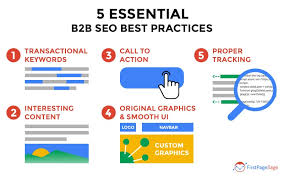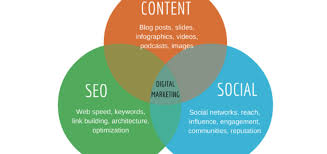Unlocking Business Growth: The Power of B2B SEO Strategies
The Importance of B2B SEO in Driving Business Growth
In the world of business-to-business (B2B) marketing, Search Engine Optimization (SEO) plays a crucial role in driving growth and success. B2B companies often have a more complex sales cycle and target audience compared to business-to-consumer (B2C) businesses. This is where a well-executed B2B SEO strategy becomes essential.
Understanding B2B SEO
B2B SEO involves optimising a company’s online presence to attract and engage other businesses looking for products or services. Unlike B2C SEO, which focuses on reaching individual consumers, B2B SEO targets businesses and decision-makers who are researching solutions for their organisations.
The Benefits of B2B SEO
Implementing a robust B2B SEO strategy offers several benefits to businesses:
- Increased Visibility: By optimising your website for relevant keywords and search terms, you can improve your visibility in search engine results pages (SERPs) when potential clients are looking for solutions you offer.
- Lead Generation: Effective B2B SEO can attract high-quality leads to your website, increasing the chances of converting them into customers. This is crucial for driving revenue growth.
- Authority Building: Consistently producing valuable content and optimising it for search engines helps establish your brand as an authority in your industry. This can enhance trust and credibility among potential clients.
- Long-Term Results: Unlike paid advertising that stops delivering results once you stop investing, B2B SEO provides long-term benefits by driving organic traffic to your site over time.
Key Strategies for B2B SEO Success
To succeed in the competitive world of B2B marketing, consider implementing the following key strategies:
- Keyword Research: Identify relevant keywords that resonate with your target audience’s search queries.
- Content Marketing: Create high-quality, informative content that addresses the pain points and challenges of your target market.
- On-Page Optimisation: Optimise meta tags, headings, and content structure to make it easier for search engines to understand your website’s relevance.
- Link Building: Build quality backlinks from reputable websites to enhance your site’s authority and credibility.
- Analyse and Iterate: Regularly monitor the performance of your SEO efforts using analytics tools and adjust your strategy based on data insights.
In conclusion, investing in a well-planned B2B SEO strategy is essential for driving business growth and staying ahead of the competition in the digital landscape. By focusing on optimising your online presence to attract valuable business leads, you can position your company as a trusted industry leader and achieve sustainable success.
Top 19 Frequently Asked Questions About B2B SEO: Understanding Its Importance and Strategies
- Why is B2B SEO important?
- What is a B2B SEO?
- Why SEO is important for B2B?
- What is SEO vs PPC for B2B?
- Is SEO useful for B2B?
- How to do SEO for B2B business?
- Is SEO relevant for B2B?
- What is the benefit of B2B SEO?
- Why is SEO important in B2B?
- How can I improve my SEO B2B?
- What does B2B mean in marketing?
- How to use SEO for B2B?
- What is B2B SEO?
- What are the 4 types of SEO?
- Does SEO Work for B2B?
- How to do SEO for B2B website?
- What is the SEO content strategy for B2B?
- Why is SEO important for B2B?
- How do you develop an effective B2B SEO strategy in 2022?
Why is B2B SEO important?
In the realm of business-to-business (B2B) marketing, the importance of B2B SEO cannot be overstated. B2B SEO is vital because it allows companies to enhance their online visibility and connect with other businesses actively seeking their products or services. By implementing a robust B2B SEO strategy, businesses can increase their chances of being discovered by potential clients, generate high-quality leads, build authority in their industry, and achieve sustainable long-term results. In essence, B2B SEO serves as a powerful tool for driving business growth, expanding market reach, and establishing credibility in the competitive digital landscape of B2B marketing.
What is a B2B SEO?
B2B SEO, short for Business-to-Business Search Engine Optimization, refers to the practice of optimising a company’s online presence to enhance its visibility and attract other businesses seeking products or services. Unlike B2C SEO, which targets individual consumers, B2B SEO focuses on reaching businesses and decision-makers who are actively researching solutions for their organisations. By implementing a tailored B2B SEO strategy that includes keyword research, content creation, and on-page optimisation, businesses can improve their search engine rankings, drive organic traffic, and generate high-quality leads within the B2B market segment.
Why SEO is important for B2B?
Search Engine Optimization (SEO) is crucial for Business-to-Business (B2B) companies because it enables them to enhance their online visibility and reach a targeted audience of businesses actively seeking their products or services. In the competitive B2B landscape, a strong SEO strategy can significantly impact lead generation, brand authority, and long-term business growth. By optimising their websites for relevant keywords and producing valuable content, B2B companies can establish themselves as industry leaders, attract high-quality leads, and drive revenue through organic search traffic. Ultimately, investing in SEO is essential for B2B organisations looking to stay ahead in the digital realm and connect with potential clients effectively.
What is SEO vs PPC for B2B?
When considering the difference between SEO and PPC for B2B marketing, it’s essential to understand that both strategies serve distinct purposes in driving business growth. Search Engine Optimization (SEO) focuses on improving organic visibility in search engine results over time, targeting specific keywords relevant to B2B products or services. On the other hand, Pay-Per-Click (PPC) advertising allows businesses to place ads at the top of search engine results for immediate visibility, with costs incurred each time a user clicks on the ad. While SEO offers long-term benefits and credibility through organic search rankings, PPC provides immediate visibility and control over ad placement. Both SEO and PPC can complement each other in a comprehensive B2B marketing strategy, with SEO laying a strong foundation for sustainable growth while PPC delivers quick results and targeted lead generation.
Is SEO useful for B2B?
The question of whether SEO is useful for B2B businesses is a common one in the digital marketing realm. The answer is a resounding yes. Search Engine Optimization (SEO) is highly beneficial for B2B companies as it helps improve online visibility, attract relevant business leads, and establish credibility within the industry. By implementing a targeted SEO strategy that focuses on optimising website content, keywords, and backlinks, B2B organisations can effectively reach their target audience, drive organic traffic to their site, and ultimately boost business growth and success in the competitive online landscape.
How to do SEO for B2B business?
When it comes to optimising SEO for a B2B business, several key steps can help enhance online visibility and attract relevant leads. Firstly, conducting thorough keyword research to identify the terms and phrases that potential business clients are searching for is crucial. Creating high-quality, informative content that addresses the specific needs and challenges of the target audience is also essential. Additionally, focusing on on-page optimisation by structuring meta tags, headings, and content in a search engine-friendly manner can improve rankings. Building a strong backlink profile through reputable sources and regularly analysing performance metrics to refine strategies based on data insights are also vital components of successful B2B SEO efforts. By implementing these strategies effectively, a B2B business can increase its online presence and generate valuable leads in the competitive digital landscape.
Is SEO relevant for B2B?
The relevance of SEO for B2B businesses is undeniable in today’s digital landscape. While B2B marketing strategies may differ from those of business-to-consumer (B2C) companies, SEO remains a critical component for driving visibility, generating leads, and establishing credibility in the B2B sector. By implementing a tailored SEO strategy that focuses on targeting key decision-makers and industry-specific search terms, B2B companies can enhance their online presence, attract high-quality leads, and ultimately drive business growth. In a competitive marketplace where online visibility is paramount, investing in SEO is essential for B2B organisations looking to stay ahead and succeed in the digital realm.
What is the benefit of B2B SEO?
Optimising a B2B website for search engines through SEO offers a multitude of benefits for businesses operating in the B2B space. One key advantage of B2B SEO is the increased visibility it provides in search engine results, allowing companies to attract relevant business leads actively seeking their products or services. By enhancing online visibility and ranking for industry-specific keywords, B2B SEO helps drive organic traffic to websites, ultimately leading to improved lead generation, higher conversion rates, and enhanced brand credibility within the target market.
Why is SEO important in B2B?
In the realm of business-to-business (B2B) marketing, the significance of SEO cannot be overstated. SEO is crucial in B2B for several reasons. Firstly, it enhances visibility and ensures that your products or services are discoverable by potential business clients actively searching for solutions online. Secondly, a well-executed B2B SEO strategy can drive targeted traffic to your website, leading to increased lead generation and higher chances of converting those leads into valuable customers. Moreover, by establishing your brand as an authority in your industry through SEO-optimised content, you can build credibility and trust among B2B decision-makers. Ultimately, SEO in the B2B space is instrumental in fostering long-term relationships with clients and driving sustainable business growth.
How can I improve my SEO B2B?
To enhance your B2B SEO, start by conducting thorough keyword research to identify relevant terms and phrases that resonate with your target audience. Create high-quality, informative content that addresses the specific needs and challenges of businesses in your industry. Optimise your website’s on-page elements, such as meta tags and headings, to improve visibility in search engine results. Implement a robust link building strategy to establish authority and credibility in your niche. Regularly analyse performance metrics and make data-driven adjustments to continuously improve your B2B SEO efforts. By focusing on these key areas, you can strengthen your online presence and attract valuable leads to drive business growth.
What does B2B mean in marketing?
In the realm of marketing, B2B stands for Business-to-Business, a term used to describe transactions and relationships between two businesses rather than between a business and individual consumers. In B2B marketing, companies market their products or services to other businesses that require them for their operations or resale. This form of marketing often involves longer sales cycles, multiple decision-makers, and a focus on demonstrating value, efficiency, and return on investment to the business customers. B2B marketing strategies aim to address the specific needs and challenges faced by businesses in various industries, fostering mutually beneficial partnerships that drive growth and success for all parties involved.
How to use SEO for B2B?
When it comes to utilising SEO for B2B purposes, businesses can leverage a tailored approach to enhance their online presence and attract potential business clients. Key strategies include conducting thorough keyword research to target industry-specific terms, creating valuable content that addresses the needs and challenges of B2B audiences, and optimising website elements such as meta tags and headings to improve search engine visibility. By focusing on building authority through quality backlinks and consistently analysing performance metrics to refine strategies, businesses can effectively harness the power of SEO to drive lead generation and establish themselves as trusted industry experts in the B2B landscape.
What is B2B SEO?
B2B SEO, short for Business-to-Business Search Engine Optimization, is a strategic digital marketing approach aimed at enhancing the online visibility and search engine rankings of businesses targeting other businesses as their primary customers. In essence, B2B SEO involves optimising a company’s website and online content to attract and engage potential business clients searching for specific products or services. By focusing on relevant keywords, quality content creation, and technical optimisation, B2B SEO helps businesses increase their organic search traffic, generate high-quality leads, and establish authority in their industry.
What are the 4 types of SEO?
In the realm of B2B SEO, understanding the different types of SEO is crucial for devising a comprehensive digital marketing strategy. The four main types of SEO include on-page SEO, off-page SEO, technical SEO, and local SEO. On-page SEO focuses on optimising individual web pages with relevant content and keywords to improve search engine rankings. Off-page SEO involves building backlinks and establishing authority through external sources. Technical SEO ensures that a website is optimised for search engine crawling and indexing. Lastly, local SEO targets geographically specific searches to help businesses attract local customers. By incorporating these various types of SEO into their approach, B2B companies can enhance their online visibility and reach their target audience effectively.
Does SEO Work for B2B?
The question “Does SEO work for B2B?” is a common inquiry among businesses operating in the B2B sector. The answer is a resounding yes. Search Engine Optimization (SEO) is highly effective for B2B companies looking to enhance their online presence, attract relevant leads, and drive business growth. By implementing a tailored SEO strategy that focuses on targeting key decision-makers and industry-specific keywords, B2B organisations can significantly improve their visibility in search engine results and establish themselves as authoritative players in their respective fields. With the right approach and ongoing optimisation, SEO can deliver tangible results for B2B businesses by generating quality leads and fostering long-term relationships with clients.
How to do SEO for B2B website?
When it comes to optimising a B2B website for search engines, implementing a strategic SEO approach is paramount. To do SEO for a B2B website effectively, businesses should start by conducting thorough keyword research to identify relevant terms that align with their target audience’s search intent. Creating high-quality, informative content tailored to address the specific needs and challenges of other businesses is essential. Additionally, focusing on on-page optimisation, building authoritative backlinks, and regularly analysing and refining the SEO strategy based on performance data are key steps in enhancing the visibility and reach of a B2B website in search engine results. By following these best practices and staying abreast of industry trends, businesses can drive organic traffic, generate quality leads, and establish themselves as industry leaders in the competitive B2B landscape.
What is the SEO content strategy for B2B?
When it comes to developing an effective SEO content strategy for B2B businesses, the key lies in creating high-quality, informative content that resonates with the target audience. B2B SEO content should be tailored to address the specific needs, challenges, and interests of other businesses and decision-makers. This involves conducting thorough keyword research to identify relevant search terms, producing valuable content such as whitepapers, case studies, and industry reports, and optimising it with on-page SEO techniques. By focusing on providing insightful and educational content that showcases expertise and addresses industry pain points, B2B companies can enhance their online visibility, attract qualified leads, and establish themselves as trusted authorities in their respective fields.
Why is SEO important for B2B?
In the realm of business-to-business (B2B) marketing, the significance of SEO cannot be overstated. SEO is crucial for B2B organisations as it serves as a powerful tool to enhance online visibility, attract quality leads, and establish credibility within the industry. By optimising their digital presence, B2B companies can effectively reach and engage other businesses seeking their products or services. A well-executed SEO strategy not only boosts brand visibility in search engine results but also fosters trust among potential clients, ultimately driving business growth and success in the competitive B2B landscape.
How do you develop an effective B2B SEO strategy in 2022?
Developing an effective B2B SEO strategy in 2022 requires a comprehensive approach that aligns with the latest trends and best practices in the digital landscape. To begin, conduct thorough keyword research to identify relevant terms and phrases that resonate with your target audience. Create high-quality, engaging content that addresses the specific needs and challenges of B2B buyers. Optimise your website’s technical aspects, such as meta tags and site structure, to enhance visibility in search engine results. Utilise data analytics to track performance and make informed adjustments to your strategy as needed. By staying up-to-date with industry changes and focusing on providing value to your audience, you can develop a successful B2B SEO strategy that drives business growth in 2022.


